Overview
The article identifies ten essential project management roles crucial for the success of startups, including positions such as Project Manager, Product Owner, and Scrum Master. Why are these roles so vital? Effective management, bolstered by automation tools and data-driven decision-making, significantly enhances productivity, governance, and alignment with business objectives. These elements are not just beneficial; they are essential for navigating the myriad challenges that new ventures face. By understanding and implementing these roles, startup founders can position their companies for success in a competitive landscape.
Introduction
In the fast-paced world of startups, the right project management roles can indeed make the difference between success and failure. As new businesses strive to navigate complex challenges, understanding the essential roles that drive project execution, team coordination, and strategic alignment becomes crucial.
This article delves into ten key project management roles that not only enhance productivity but also foster innovation and agility. However, with so many responsibilities to juggle, how can startups ensure they are leveraging these roles effectively to maximize their potential?
Casy: Automate Task Management and Enhance Team Productivity
Casy operates as an invisible project manager, seamlessly integrating with chat platforms like Slack and Telegram while fulfilling project management roles. By automatically capturing key information from conversations, it transforms discussions into actionable tasks, sets deadlines, and updates documents without requiring manual input. This level of automation significantly reduces administrative overhead, allowing teams to concentrate on their core activities.
With features such as task categorization and the implementation of methodologies like OKRs and the Eisenhower Matrix, Casy enhances visibility and prioritization. This makes it an essential tool for new businesses in project management roles that aim to boost productivity and optimize workflows. In fact, organizations that adopt automated task coordination tools can reclaim nearly 30 hours per year for each team member. This statistic underscores the substantial impact on efficiency.
As 90% of organizations are undergoing some form of digital transformation, new companies increasingly recognize the importance of project management roles in overseeing automation for tasks. Casy not only simplifies processes but also provides specific features that enhance productivity and innovation. Are you ready to start applying automation in your management practices? New businesses should evaluate their existing workflows and identify repetitive tasks that can be automated. This enables them to focus on strategic initiatives, ultimately driving growth and success.
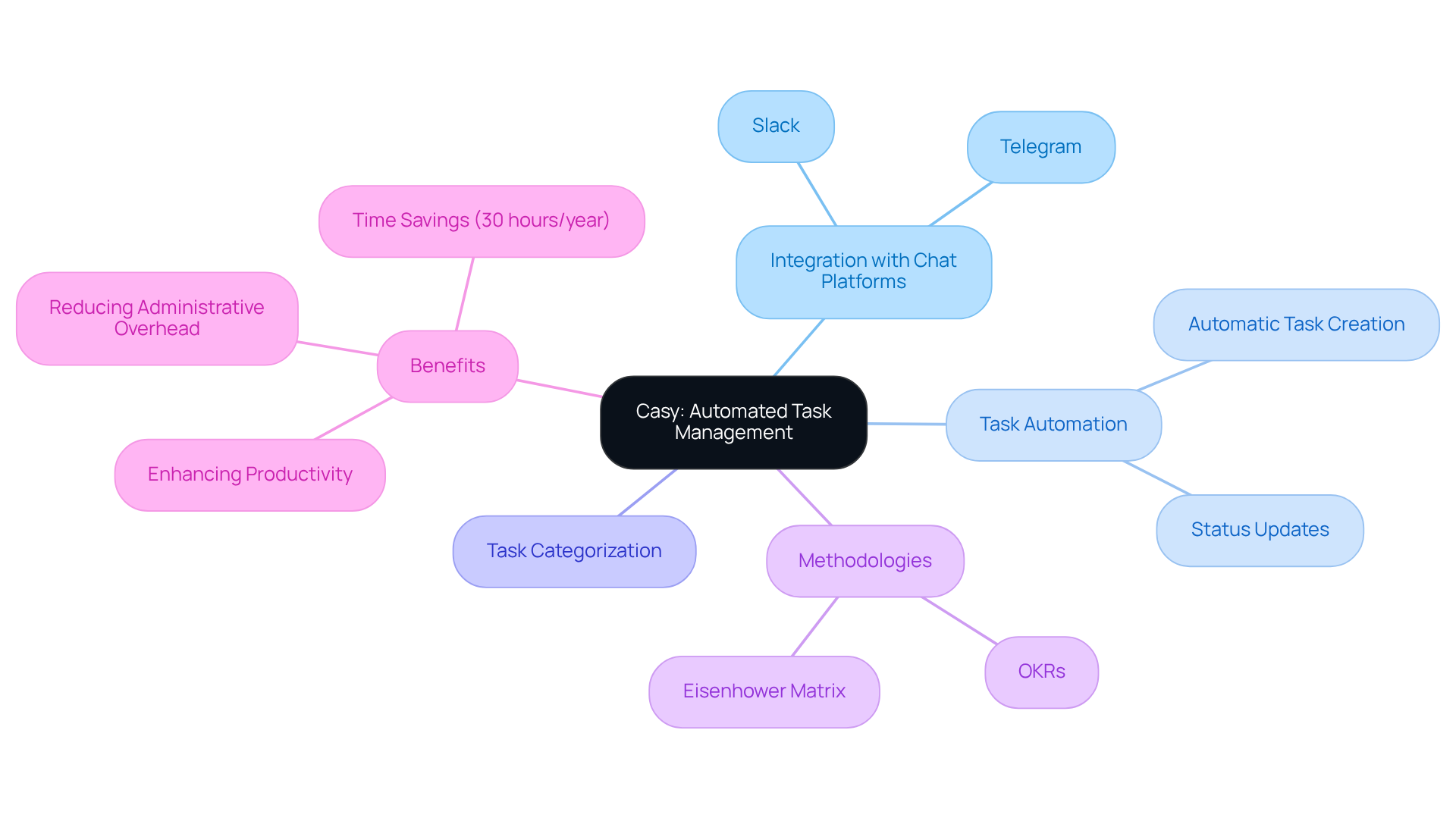
Project Manager: Oversee Project Execution and Team Coordination
In the dynamic landscape of startups in 2025, the role of the manager is pivotal for steering execution and fostering cohesion among team members. Managers are responsible for coordinating tasks, managing timelines, and facilitating effective communication within the group. By leveraging automation tools like Casy, they can streamline updates and focus on strategic decision-making—an essential component for driving success and enhancing team cohesion.
Statistics reveal that organizations employing project management roles achieve a remarkable 92% success rate in reaching their goals, underscoring the critical role of efficient oversight in new ventures. Moreover, effective managers emphasize that automation not only reduces administrative burdens but also boosts overall efficiency. Users of Casy experience lower coordination costs and increased productivity.
As startups continue to evolve, the integration of advanced task coordination tools like Casy will be vital in overcoming challenges and achieving sustainable success. Startup founders should seriously consider implementing Casy to refine their management processes and stimulate innovation.
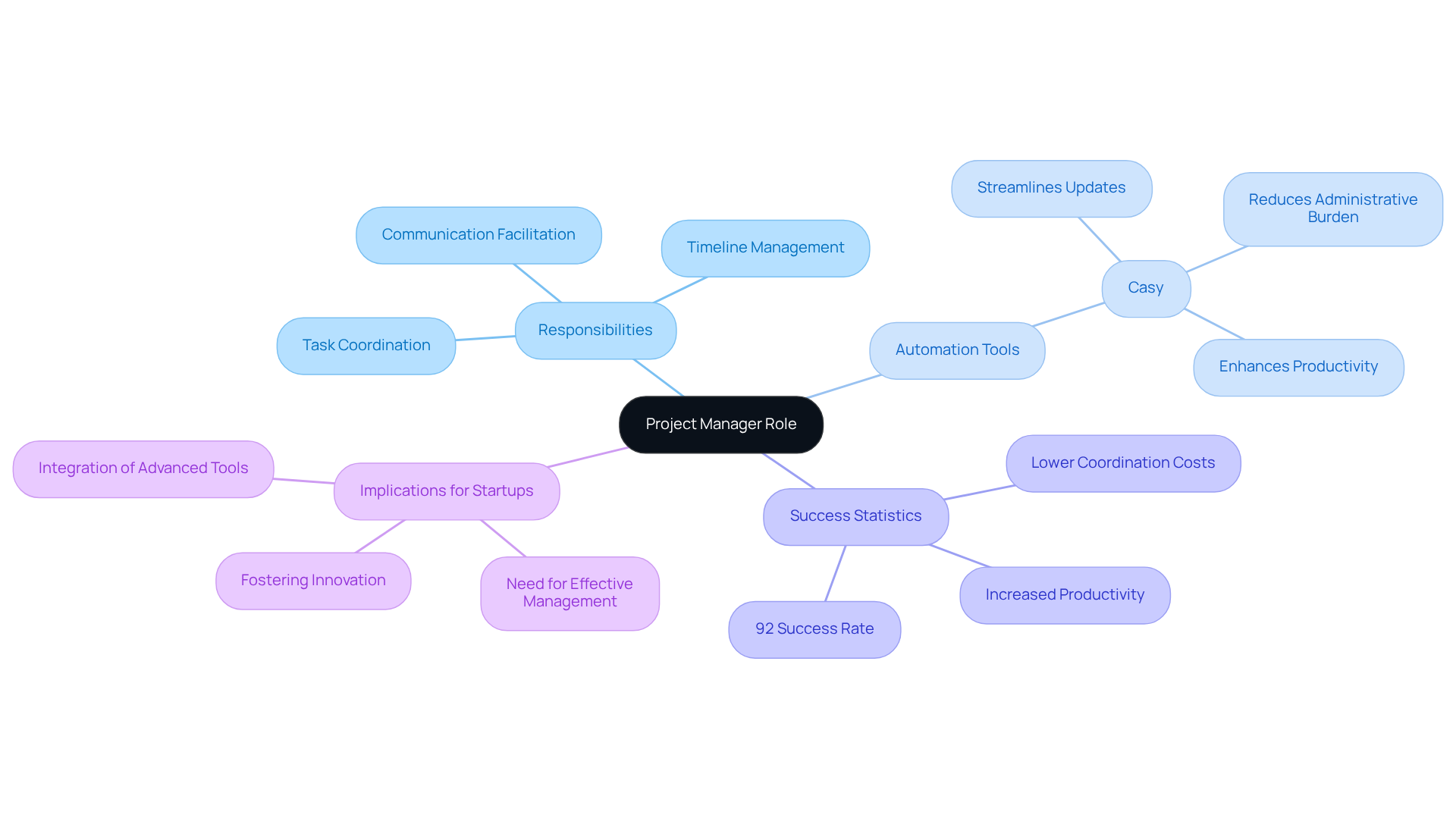
Product Owner: Define Goals and Maximize Product Value
The product owner plays a pivotal role in defining the project's vision and ensuring the delivery of maximum value to customers. They prioritize features, manage the product backlog, and maintain clear communication with stakeholders to align the product with evolving market needs. In 2025, effective product ownership in new ventures relies on the capacity to adjust to evolving demands, utilizing Agile frameworks to maintain the group’s focus on high-impact outcomes.
Statistics indicate that nearly 80% of product management executives report that their groups' market knowledge is below target. This underscores the pressing need for product owners to enhance their understanding of market dynamics. By effectively managing the product backlog and engaging in continuous feedback loops, product owners can drive innovation and ensure that the product aligns with both user expectations and business objectives.
This adaptability is crucial for navigating the dynamic landscape of startups, where the ability to pivot quickly can significantly impact success. Consider this: how well do you understand your market? Additionally, methodologies like OKRs and the Eisenhower Matrix can help product owners prioritize tasks effectively, ensuring that they focus on what truly matters.
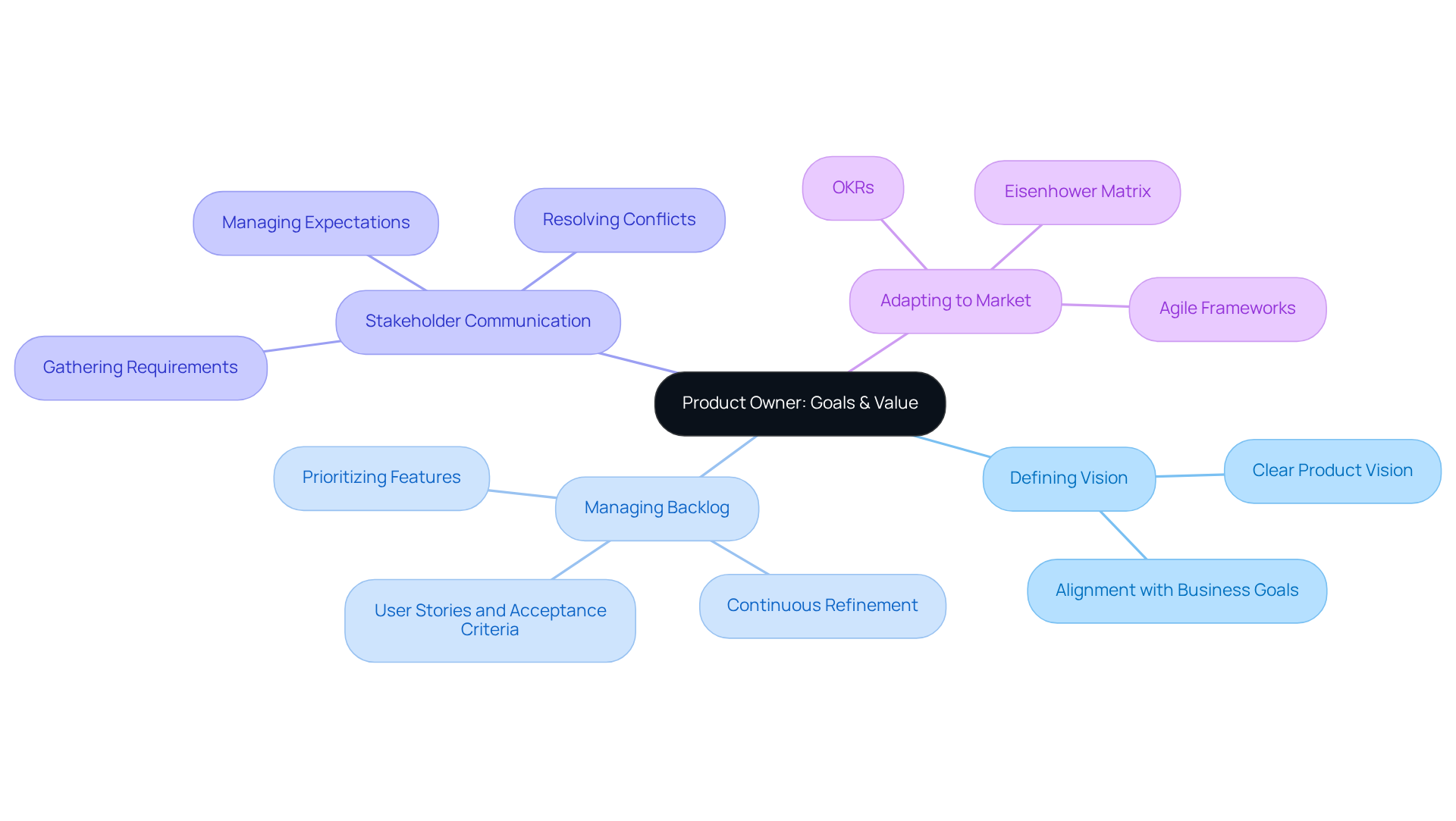
Scrum Master: Facilitate Agile Processes and Team Efficiency
The Scrum Master is pivotal in facilitating Agile processes, ensuring adherence to Scrum principles and practices. By effectively eliminating barriers and fostering cooperation, they significantly enhance team efficiency. In 2025, successful Agile applications in new ventures have shown that teams led by proficient Scrum Masters can achieve remarkable productivity gains. This is primarily due to the Scrum Master's ability to cultivate a culture of continuous improvement, enabling startups to swiftly adapt to changes and deliver high-quality products in a fast-paced environment.
Furthermore, it's noteworthy that 87% of Scrum teams conduct Daily Scrum meetings. These gatherings are essential for maintaining communication and addressing challenges promptly. Not only do these meetings streamline workflows, but they also allow teams to focus on their primary objectives, ultimately leading to improved outcomes and greater satisfaction among participants. As highlighted by CA Technologies, teams that effectively implement Scrum can significantly boost their productivity, underscoring the critical importance of project management roles, particularly that of the Scrum Master, in this transformative process.
Are you ready to harness the power of a Scrum Master in your organization? The evidence is compelling: a skilled Scrum Master can be the catalyst for your startup's success.
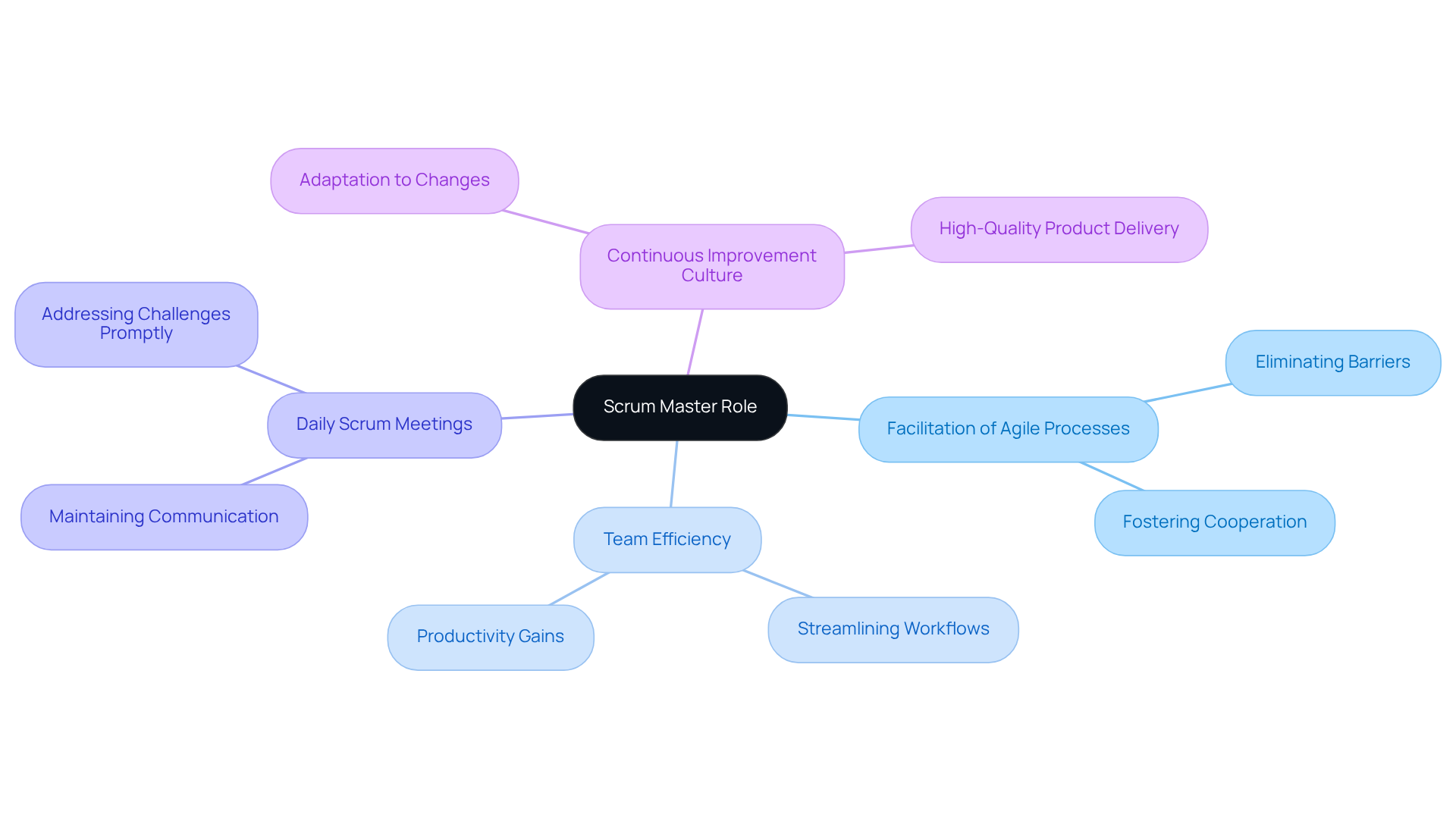
Business Analyst: Identify Requirements and Support Data-Driven Decisions
Business analysts are pivotal in identifying requirements and ensuring that teams thoroughly understand deliverables. They analyze data and gather insights that bolster decision-making processes, aligning team efforts with overarching business objectives. By leveraging data analytics tools, business analysts uncover valuable insights that significantly drive success and enhance overall productivity.
Did you know that organizations prioritizing data-driven decision-making report an average cost reduction of 10%? This statistic underscores the importance of effective data management in achieving objectives.
As we move into 2025, new ventures are increasingly adopting data-driven strategies, with 91% of businesses believing that data-driven decision-making (DDDM) is critical to their success. Consequently, the demand for skilled business analysts is expected to rise. Their ability to bridge the gap between business needs and technological solutions is becoming indispensable. This alignment not only improves operational efficiency but also fosters a culture of continuous enhancement, where data insights inform strategic decisions and optimize results.
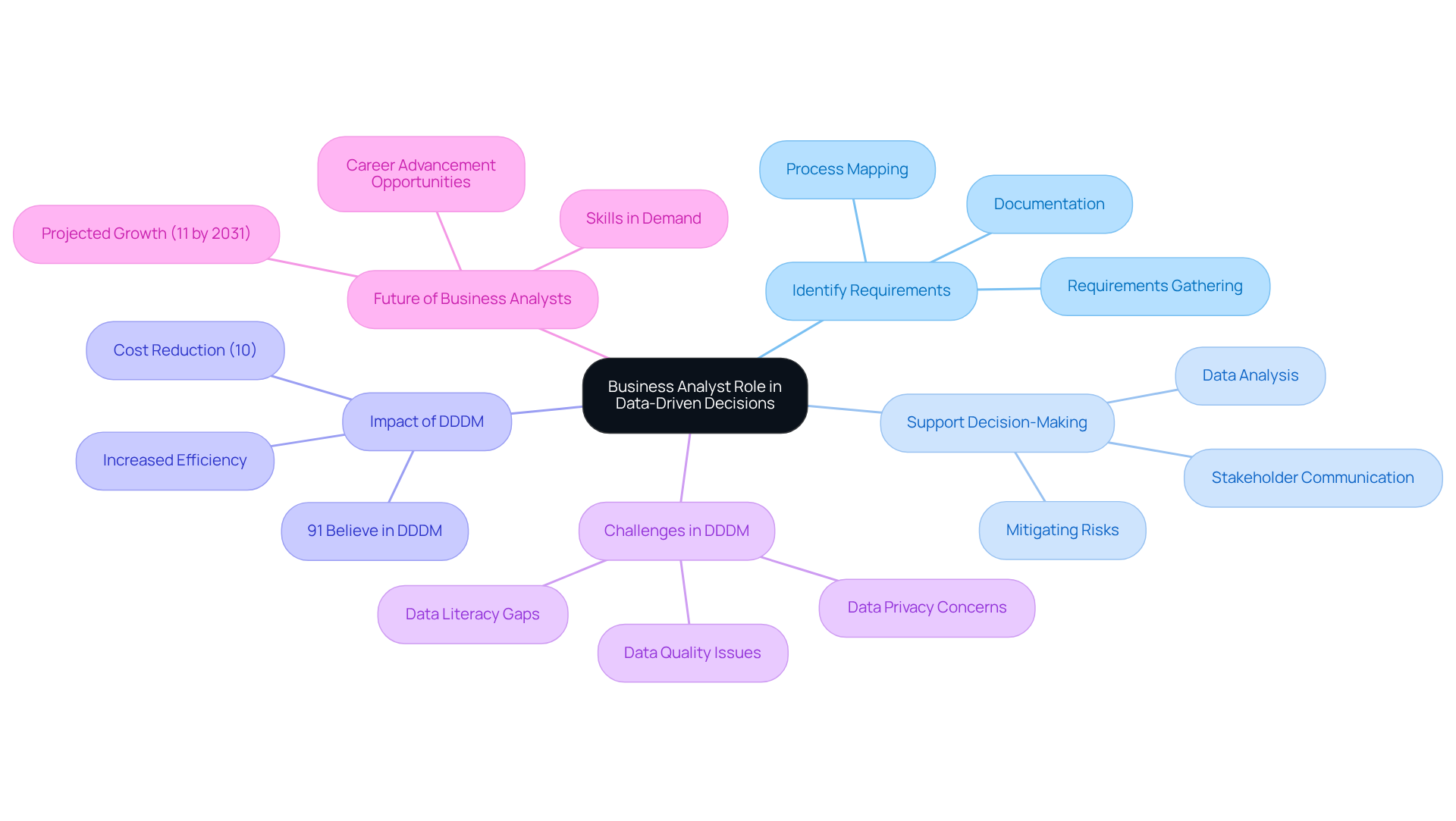
PMO: Ensure Governance and Support for Project Management Practices
The Project Oversight Office (PMO) is pivotal in ensuring governance and enhancing initiative oversight practices within startups. By establishing standardized processes and monitoring performance, the PMO significantly boosts accountability and efficiency. Research shows that companies lacking effective project management roles experience a two-thirds increase in project failure rates, highlighting the urgent need for robust governance. With 89% of organizations operating at least one PMO, it is clear that their perceived value is substantial.
Moreover, the PMO fosters knowledge sharing among teams, cultivating a culture of continuous improvement and innovation. Looking ahead to 2025, best practices for PMOs will stress agility and adaptability, enabling new businesses to swiftly respond to evolving market demands. By embracing these practices, the PMO not only supports project management roles but also aligns strategically with organizational objectives, ultimately leading to successful delivery and enhanced operational performance.
As C.K. Prahalad underscores, taking responsibility for outcomes is crucial, and the PMO plays an instrumental role in achieving this within startups. Are you ready to leverage the power of a PMO to drive your startup's success?
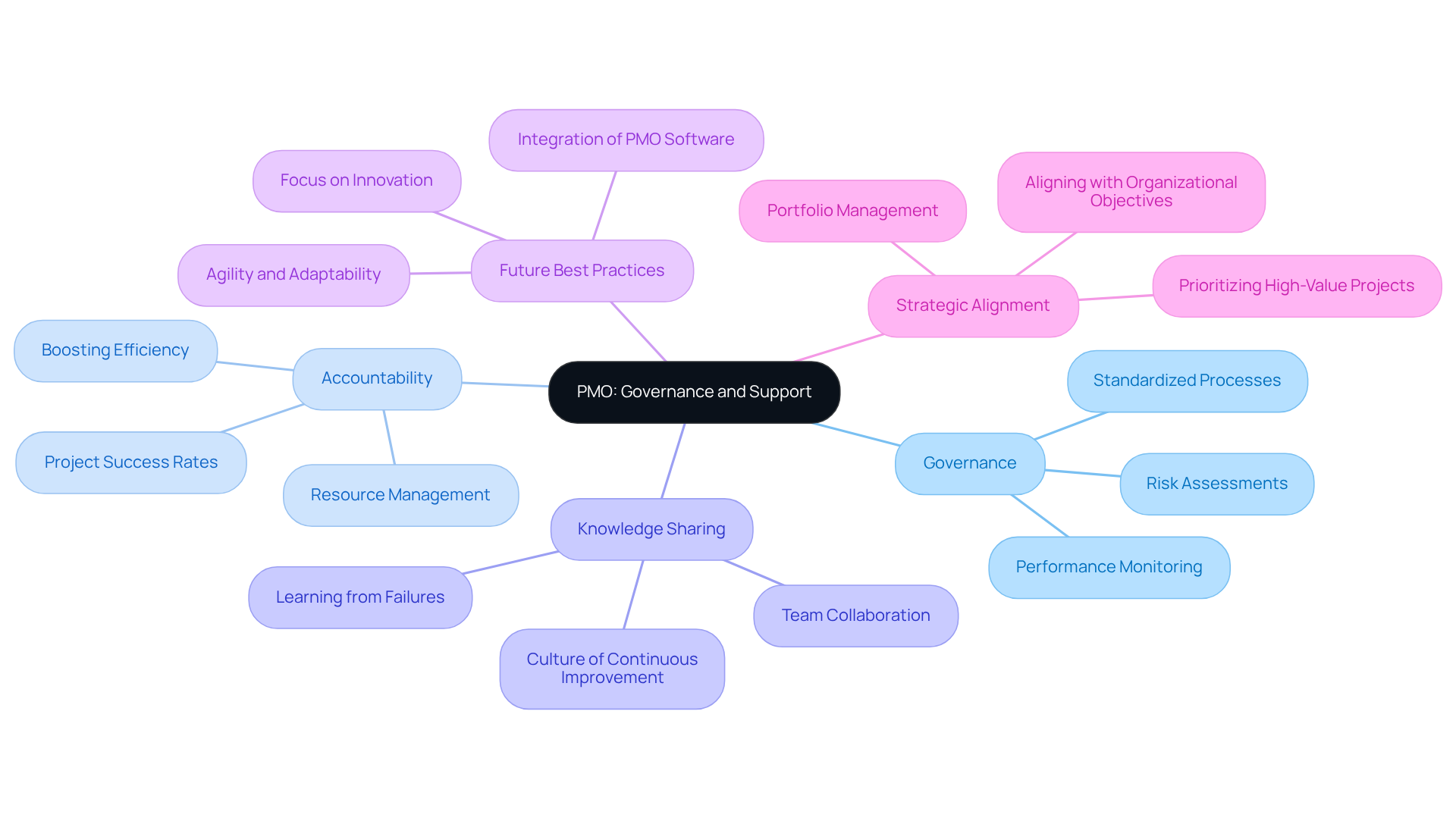
Resource Manager: Optimize Resource Allocation and Utilization
Resource managers play a crucial role in optimizing resource distribution and utilization across various project management roles. They assess team capabilities, manage workloads, and guarantee that resources are effectively allocated to fulfill project management roles and meet project demands.
How can you ensure your resources are being maximized? By leveraging tools like Casy, resource managers gain valuable insights into team capacities, enabling them to make informed decisions that enhance productivity and drive results.
With the right approach, you can transform your resource management strategy and achieve greater success.
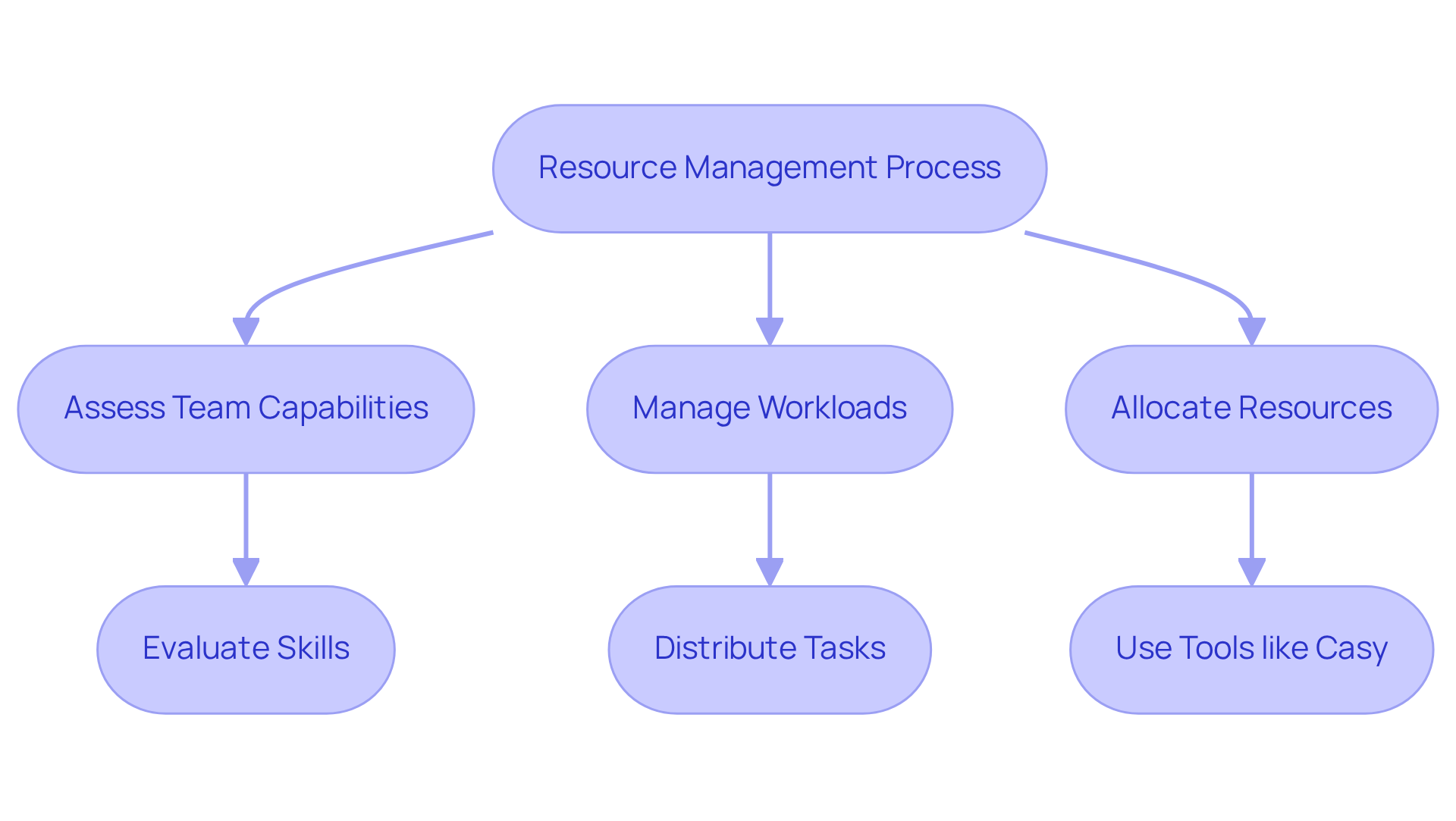
Marketing Manager: Promote Projects and Engage Target Audiences
Marketing managers play a pivotal role in promoting initiatives and engaging target audiences across various channels. They are responsible for developing comprehensive marketing strategies that support project management roles, ensuring initiatives gain the visibility necessary to attract customers. By producing engaging content and overseeing targeted campaigns, marketing managers empower new businesses to maximize their reach and influence in a competitive landscape.
Looking ahead to 2025, the demand for skilled marketing managers is expected to surge, as new businesses increasingly recognize the importance of effective marketing strategies. Statistics indicate that acquiring new clients remains the primary marketing objective for these businesses, closely followed by retaining existing ones. This dual focus highlights the necessity for marketing managers to engage audiences through innovative approaches, such as leveraging social media and email marketing—two of the most actively used platforms for brand awareness. Notably, email marketing delivers the highest ROI among marketing channels, making it an essential component of any new business's strategy.
Moreover, 70% of marketers concur that community building is vital for customer retention, with 82% of consumers more inclined to purchase from brands that cultivate engaging online communities. This underscores the importance of authentic branding and strategic communication in enhancing visibility and fostering customer loyalty. Additionally, SEO marketing boasts a conversion rate of 14.6%, significantly surpassing outbound marketing's 1.7%, further emphasizing the effectiveness of digital strategies. As startups navigate the evolving marketing landscape, project management roles will be crucial for marketing managers in shaping successful strategies that resonate with target audiences.
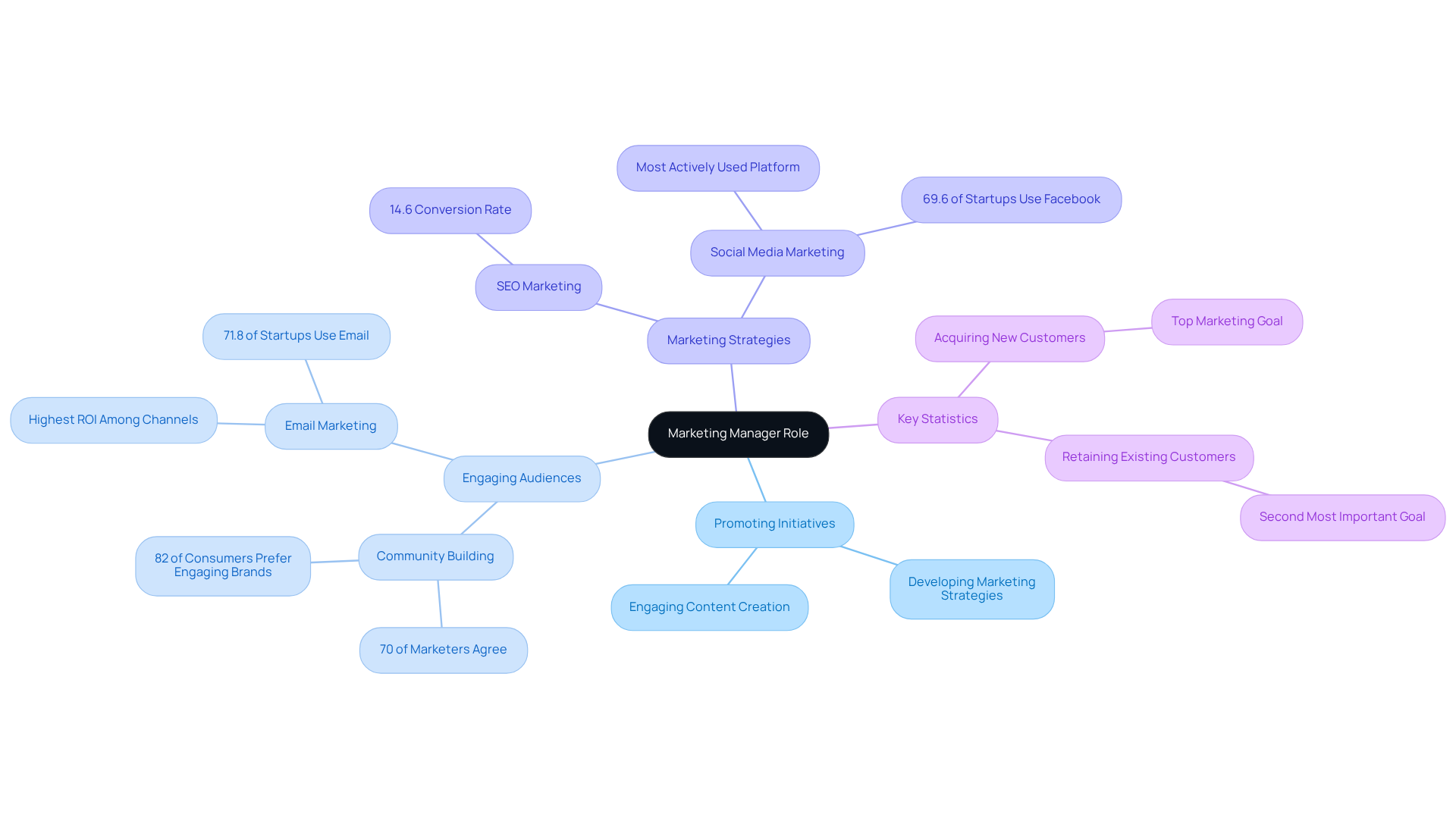
Quality Assurance Specialist: Ensure Deliverables Meet Quality Standards
Quality assurance specialists play a pivotal role in ensuring that deliverables not only meet quality standards but also align with customer expectations. Their responsibilities encompass:
- Conducting thorough testing
- Identifying defects
- Collaborating effectively with teams to implement meaningful improvements
Have you considered the impact of prioritizing quality assurance in your startup? By doing so, you can significantly enhance customer satisfaction while simultaneously reducing the risk of costly rework. This strategic focus ultimately contributes to the success of your venture.
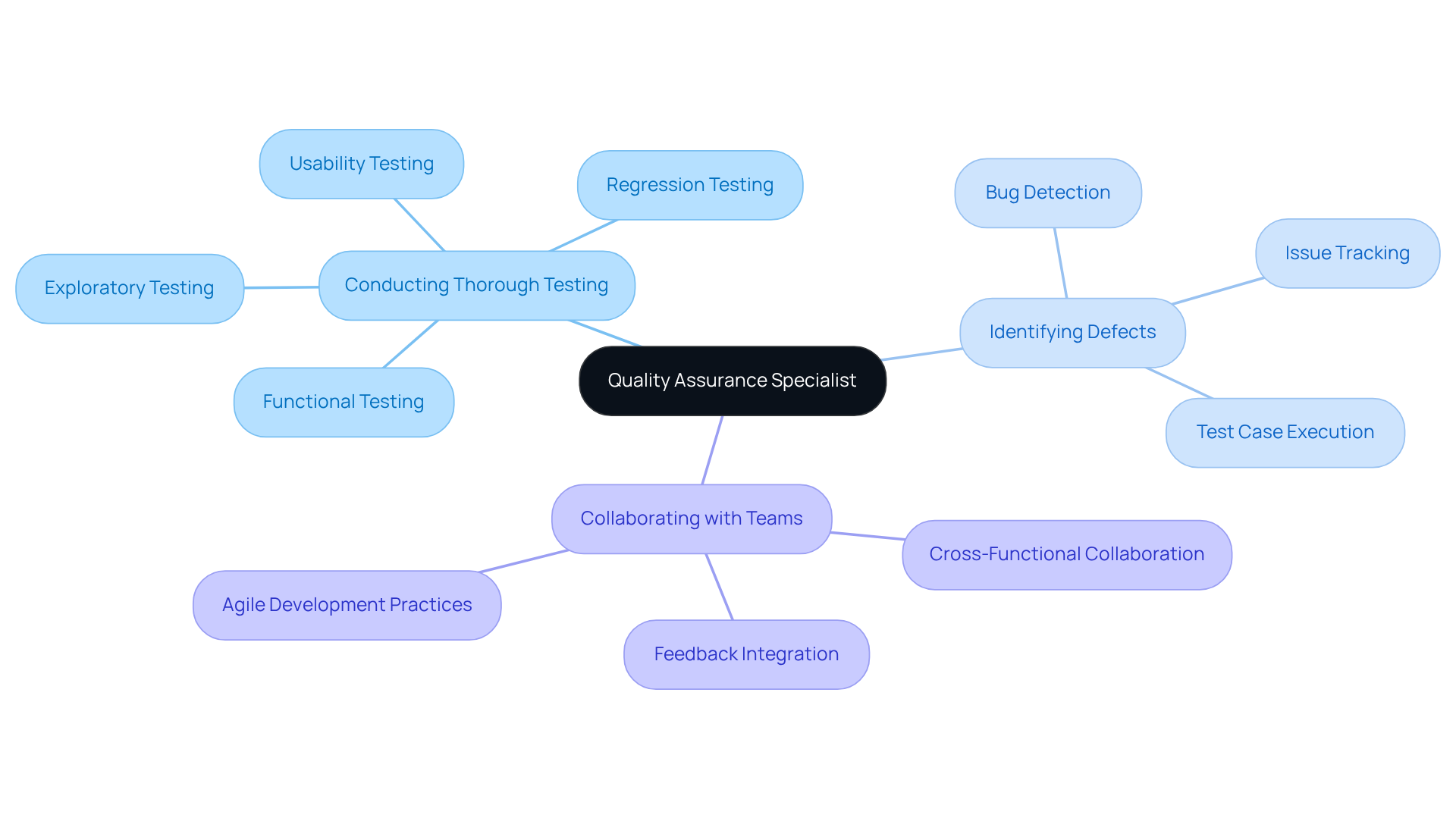
Stakeholder Manager: Manage Relationships and Align Projects with Business Objectives
Stakeholder managers are pivotal in establishing connections with key stakeholders, ensuring that initiatives are closely aligned with overarching business objectives. Their responsibilities encompass:
- Communicating updates on the initiative
- Soliciting feedback
- Addressing concerns
Each of these responsibilities is vital for sustaining stakeholder support. By nurturing these relationships, stakeholder managers empower startups to navigate challenges effectively, thereby increasing their likelihood of success. In fact, organizations that excel in stakeholder coordination observe a 20% increase in customer satisfaction and a 40% reduction in delays. This proactive engagement not only fosters trust but also drives initiatives to deliver substantial value to the organization, underscoring the critical nature of stakeholder relationships in achieving strategic objectives.
Furthermore, regular oversight of stakeholders is essential for effective leadership and operational processes, ensuring that their needs and expectations remain consistently aligned with objectives. As startups continue to evolve in 2025, the capacity to align projects with business objectives through effective project management roles and stakeholder management will emerge as a key determinant of success.
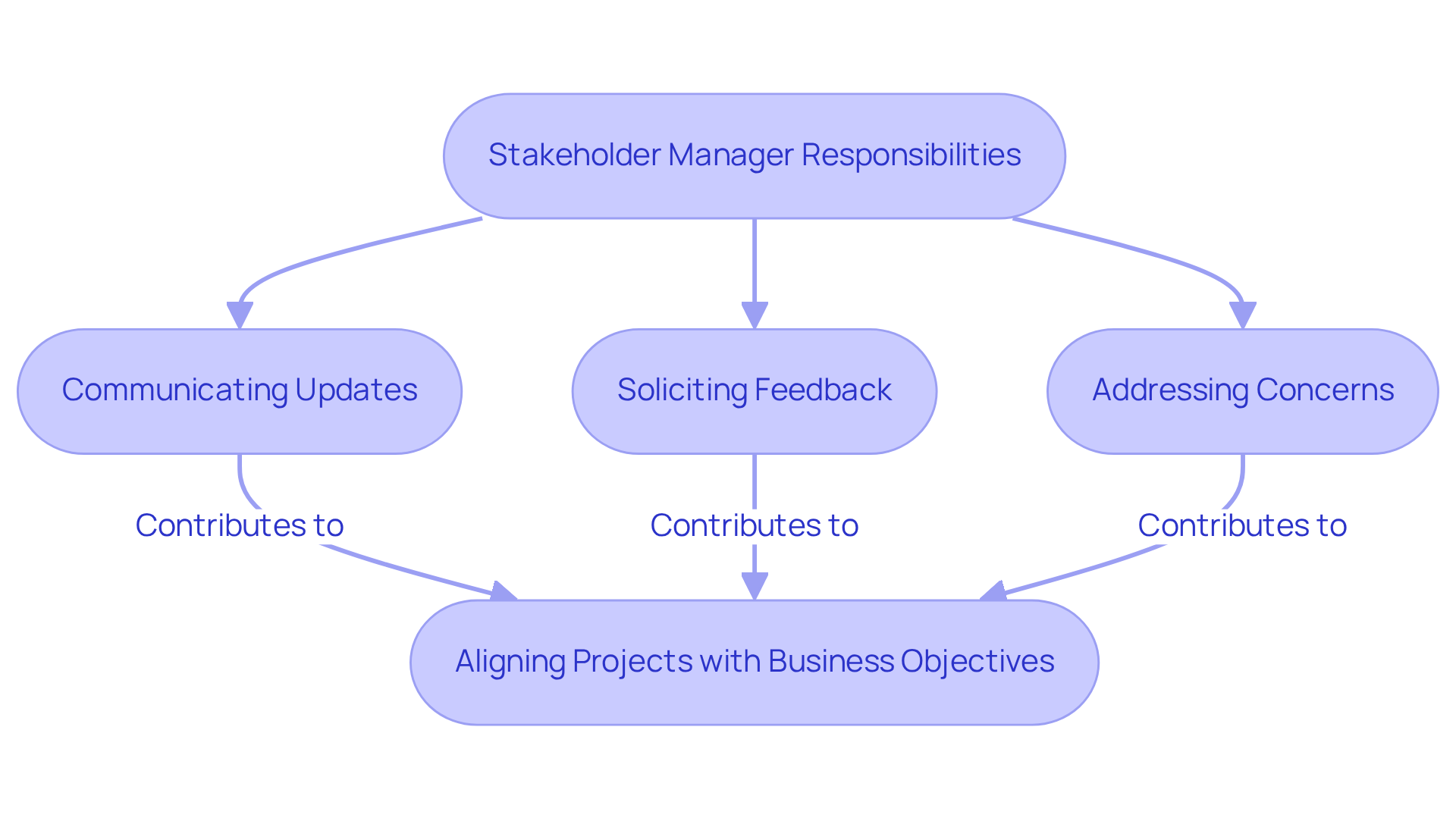
Conclusion
Understanding the essential project management roles is crucial for startup success, particularly in the evolving landscape of 2025. Each role, from the project manager to the stakeholder manager, plays a significant part in ensuring that initiatives are executed efficiently and aligned with business objectives. By leveraging automation tools like Casy, startups can streamline processes, enhance productivity, and focus on strategic growth.
Key roles such as the product owner, Scrum Master, and business analyst are paramount. Their responsibilities in defining goals, facilitating Agile processes, and supporting data-driven decisions cannot be overstated. Furthermore, the importance of quality assurance and effective stakeholder management is highlighted, showcasing how these functions contribute to achieving high standards and fostering strong relationships that drive project success.
Ultimately, the integration of these project management roles not only enhances operational efficiency but also positions startups to navigate challenges and seize opportunities in a competitive market. Embracing these roles and practices can lead to improved outcomes, increased customer satisfaction, and sustained growth. Startups are encouraged to evaluate their current practices and consider how these essential roles can be effectively implemented to achieve their strategic objectives.
Frequently Asked Questions
What is Casy and how does it work?
Casy is an automated task management tool that integrates with chat platforms like Slack and Telegram. It captures key information from conversations, transforms discussions into actionable tasks, sets deadlines, and updates documents automatically, reducing the need for manual input.
What are the benefits of using Casy for teams?
Casy significantly reduces administrative overhead, allowing teams to focus on their core activities. It enhances visibility and prioritization through features like task categorization and methodologies such as OKRs and the Eisenhower Matrix, ultimately boosting productivity and optimizing workflows.
How much time can organizations save by using automated task coordination tools like Casy?
Organizations that adopt automated task coordination tools can reclaim nearly 30 hours per year for each team member, highlighting the substantial impact on efficiency.
Why is project management important for startups?
Project management is crucial for startups as it ensures efficient oversight, coordination of tasks, management of timelines, and effective communication among team members, contributing to a higher success rate in achieving goals.
What is the success rate of organizations that employ project management roles?
Organizations that utilize project management roles achieve a remarkable 92% success rate in reaching their goals.
What role does the product owner play in a project?
The product owner defines the project's vision, prioritizes features, manages the product backlog, and communicates with stakeholders to ensure the product aligns with market needs and delivers maximum value to customers.
What challenges do product owners face in 2025?
Product owners face the challenge of enhancing their understanding of market dynamics, as nearly 80% of product management executives report their groups' market knowledge is below target.
How can product owners drive innovation?
By effectively managing the product backlog and engaging in continuous feedback loops, product owners can ensure that the product aligns with user expectations and business objectives, driving innovation.
What methodologies can help product owners prioritize tasks effectively?
Methodologies like OKRs (Objectives and Key Results) and the Eisenhower Matrix can assist product owners in prioritizing tasks to focus on high-impact outcomes.




